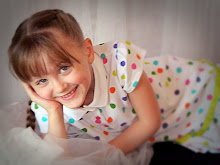The words are never easy to hear, whether it is from a doctor trying to gently break the news at a 20 week ultrasound, or in the delivery room shortly after birth, or in a chaotic emergency room days or weeks later..."We think there is something wrong with your baby's heart." Those words change everything. Hopes and dreams go crashing to the floor; thoughts of the future come to a screeching halt, and the fear creeps in -- the fear that you don't want to admit aloud...the fear that you might outlive your own child.
Corey and I first heard those words in the E.R. when Lynnea was seven days old. We knew throughout her life that there was a very real chance that we would outlive her. I remember the first time we spoke about this to each other. We were driving back to the hospital to be with her after my six week postpartum check up. We desperately hoped that this fear would never become reality, but we couldn't ignore the fact that her heart defect meant that there was a very real chance that it would.
That's what comes along with the words, "We think there is something wrong with your baby's heart." One out of every hundred babies is born with a congenital heart defect. This means that in the U.S. approximately 40,000 sets of parents have to hear those words, and 4,000 of those families will never get to have a birthday party for their babies. Congenital heart defects are the most common type of birth defect worldwide, and the leading cause of defect-related infant deaths. Sometimes these defects are diagnosed prenatally, sometimes they are missed. Some require one open heart surgery; some require several; some require only close monitoring by a cardiologist. All of them are very scary for the parents.
February 7-14 is CHD Awareness Week. Awareness brings funding (nearly twice as many children die from Congenital Heart Defects in the United States each year as from all forms of childhood cancers combined, yet funding for pediatric cancer research is five times higher than funding for Congenital Heart Defects), which is an important part of finding treatments for these heart conditions, but awareness isn't just about raising money. It is also a way of increasing support for families that are faced with devastating news and challenging situations.
Awareness is also about detecting and diagnosing congenital heart defects earlier, rather than later. When babies are born, there is a whole panel of things that make up standard newborn screening -- their hearing is checked, a heel-prick is done to check for PKU, etc. Some of these tests, like the hearing test, are non-invasive and painless for the baby, while others, like the heel-prick hurt. Screening for heart defects can be done with a simple non-invasive test (pulse oximetry) that causes no harm or pain to the baby. Currently, this is not standard practice at every hospital in the U.S. There is work being done on the governmental level to make this screening a standard part of newborn care, but changing policies takes time. For us, Lynnea's defect was not diagnosed prenatally, or in the hospital after birth; in fact, we were sent home with her believing that we had a perfectly healthy newborn. If I had known about pulse oximetry at the time, I would have asked for it, and her condition would have been diagnosed much sooner, saving us from the emotional mayhem of that night in the emergency room. This is why awareness is so important. Awareness can save lives.
Subscribe to:
Post Comments (Atom)






No comments:
Post a Comment